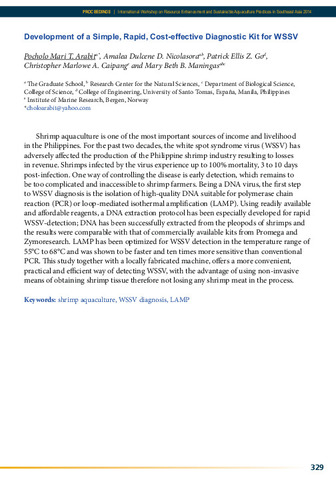Development of a simple, rapid, cost-effective diagnostic kit for WSSV
Share
Abstract
Shrimp aquaculture is one of the most important sources of income and livelihood in the Philippines. For the past two decades, the white spot syndrome virus (WSSV) has adversely affected the production of the Philippine shrimp industry resulting to losses in revenue. Shrimps infected by the virus experience up to 100% mortality, 3 to 10 days post-infection. One way of controlling the disease is early detection, which remains to be too complicated and inaccessible to shrimp farmers. Being a DNA virus, the first step to WSSV diagnosis is the isolation of high-quality DNA suitable for polymerase chain reaction (PCR) or loop-mediated isothermal amplification (LAMP). Using readily available and affordable reagents, a DNA extraction protocol has been especially developed for rapid WSSV-detection; DNA has been successfully extracted from the pleopods of shrimps and the results were comparable with that of commercially available kits from Promega and Zymoresearch. LAMP has been optimized for WSSV detection in the temperature range of 55°C to 68°C and was shown to be faster and ten times more sensitive than conventional PCR. This study together with a locally fabricated machine, offers a more convenient, practical and efficient way of detecting WSSV, with the advantage of using non-invasive means of obtaining shrimp tissue therefore not losing any shrimp meat in the process.
Description
Abstract only.
Suggested Citation
Arabit, P. M. T., Nicolasora, A. D. D., Go, P. E. Z., Caipang, C. M. A., & Maningas, M. B. B. (2015). Development of a simple, rapid, cost-effective diagnostic kit for WSSV. In M. R. R. Romana-Eguia, F. D. Parado-Estepa, N. D. Salayo, & M. J. H. Lebata-Ramos (Eds.), Resource Enhancement and Sustainable Aquaculture Practices in Southeast Asia: Challenges in Responsible Production of Aquatic Species: Proceedings of the International Workshop on Resource Enhancement and Sustainable Aquaculture Practices in Southeast Asia 2014 (RESA) (p. 329). Tigbauan, Iloilo, Philippines: Aquaculture Department, Southeast Asian Fisheries Development Center.


